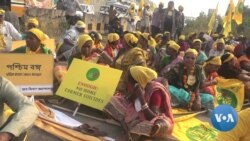Vimla Yadav, a farmer from India's Haryana state, says agriculture costs, such as fertilizers and seeds, have soared, yet produce prices have plunged, leaving her family of 10 with virtually no profit from their four-acre farm. "We don't even get the fruits of the labor that the entire family puts in on the farm, although we slog day and night," she laments.
Yadav is one of the tens of thousands of angry farmers from around the country who poured into the Indian capital recently, demanding a special session of parliament to discuss their demands:better prices for farm produce and a waiver by the government from repaying loans taken from banks.
The protest highlighted the deepening distress among the population in the countryside, where there is growing concern about diminishing agricultural profits because many are being driven into debt.
In a country where half the population of 1.3 billion depends on agriculture, low farm profits have long been a challenge and prompted promises by Prime Minister Narendra Modi to double rural incomes by 2022. But the growing disenchantment among the farming community could pose a challenge to Modi as he seeks re-election next year.
According to the government, the average income of a farmer is about $100 a month. But many make less, said Yogendra Yadav, one of the main leaders of the protest and founder of the farmers group Jai Kisan Andolan. The Yadavs are not related.
"For a majority of them, the income is probably less than $50 a month. That is the level at which they survive. And one of the principal reasons for that is that they don't get enough price for their crops," Yogendra Yadav said.
Low prices for crops are not the only problem: increasingly erratic weather patterns pose a new challenge in a country where nearly half the farmers lack access to irrigation.
In eastern Orissa state, for example, back-to-back droughts over the past two years have brought widespread distress.
"There has been very little rain this year," said Lakhyapati Sahu, a farmer who traveled from Orissa, one of India's poorer states. "We face a massive problem due to successive droughts."
According to various studies, nearly half of Indian farmers have said they want to quit working on the land but cannot do so because of a lack of alternate livelihoods.
Despite the challenge of finding work, Parul Haldar, a farmer from West Bengal, said she wants to migrate with her entire family to the city. "I will give up farming and go to Kolkata and look for work to make a living. There is no money to be earned from the farm," she added.
Although the rural crisis has been festering for many years, economists partly blame the deepening crisis on a sweeping currency ban that led to widespread cash shortages two years ago and affected their incomes.
"Many farmers lost working capital, they had to borrow money from the banks or from the local moneylenders at high interest rates, so their costs went up," economist Arun Kumar said. "So if costs go up and revenue comes down, then income gets squeezed."
Protests by farmers have intensified in the past two years as they try to draw attention to the usually forgotten countryside — their recent march was their fourth and largest to Delhi so far this year. They have also held marches in other cities like Kolkata and Mumbai. In June, farmers in several parts of the country threw their produce on the streets to highlight low prices. And last year, farmers from southern India protested in New Delhi with skulls to draw attention to suicides by farmers.
"Farmers are saying enough is enough, now something needs to be done," Yogendra Yadav said. "Both the economic and ecological crisis is leading to an existential crisis, farmers are committing suicide, they are quitting farming."
Political analysts also said the growing rural anger could erode support for Prime Minister Modi in the countryside ahead of next year's scheduled elections. Farmers make up an important voting bloc.
"Opposition to Modi is growing. Unless you have rural support, no party can win on [the] basis of urban support only," said Satish Misra, of the Observer Research Foundation in New Delhi. "The distress is real. The agriculture issue needs to be addressed in a very focused manner."
Farmer Protests Highlight India's Growing Rural Distress
NEW DELHI —





